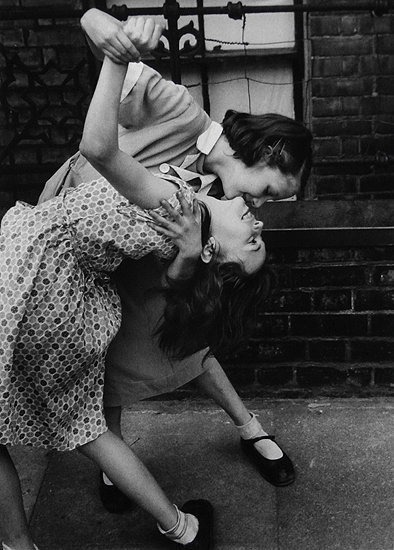Usage: Breton
Meaning: "token of the egg" (unconfirmed)
(KLAYR-vee)
This quirky-cool Celtic name belongs to about 800 French citizens, with 200 more named Clervie: the sleek French spelling.
Clever Klervi (pronounced "Claire-vee") is the recently revived Breton form of Creirwy, a Welsh name of somewhat disputed meaning, which in legend belonged to the beautiful daughter of Ceridwen.
Saint Klervi was the younger sister of the great Saint Winwaloe, founder of Brittany's first abbey. In fact, all of Winwaloe's immediate family are regarded as saints, including their mother Gwen "the Triple-Breasted" (!!!). This semi-legendary family migrated from Britain to Brittany (then Armorica) in the 5th or 6th century AD.
Klervi, a patron of the blind, is remembered in connection with a surreal incident from her girlhood. Equal parts silly and morbid, the ancient legend of Saint Klervi involves an eyeball and an unsavory goose, and could be a Brothers Grimm fairy tale for all its ridiculousness.
 |
| 16th-c. statue of Klervi & W. |
Saint
As the story goes, little Klervi was playing outdoors when a wild goose attacked, managing to peck out and swallow her eye (both eyes are devoured in some versions)! Curiouser still, her brother arrives on the scene and catches the vicious gander, guts it and extracts the eyeball from the bird's belly. He then placed it back in her socket, and, because both siblings were holy persons, this actually worked; after Winwaloe recited a prayer and made the sign of the cross over her, Klervi's eye became "as clear and beautiful as ever" and her vision simply, miraculously returned, as though nothing had happened.The strange tale is memorialized in a 400-year-old fountain located in Keravézan, a village in the extreme west of Brittany; its alcove features a rough-hewn statue of Winwaloe and Klervi, him gripping the feathered culprit and the eyeball and her, about half his size, to his left.
She shares her 3rd October nameday (though some sources give it as 21 December) with her mother, the patron saint of breasts, and probably an adapted fertility goddess.
Klervi is the modern form of her name. She was born in Wales or Cornwall probably as Chreirbia (beginning with an extremely aspirated or guttural "k'h") or Creirvie or something like it.
Goddess
About Ceridwen's daughter Creirwy, not much is remembered beyond what the Hanes Taliesin has to say: "the fairest maiden in the world was she". She's been linked to Creiddylad, another obscure Welsh figure who could well be the origin of Cordelia.As for etymology, Creirwy's first element is decidedly Welsh creir = "a token, sacred object, jewel, treasure". Hence, the "jewel, pearl" meaning that many French name sites assign to Klervi is true, just not the whole truth. The second part, -wy is less certain, but possibly represents Middle Welsh wy = "egg".
Interestingly the Cardiff Museum's 1893 inventory contains an entry "Mundane Egg (Y Creirwy)" reading:
"In Druidic lore the 'mundane egg' (creirwy) seems to have symbolized chaos, the beginning of all things, and upon it oaths were administered."Apparently the name referred to the magic "Druid's egg": a mythological object steeped in esoteric mystery. (A fair amount has been written on the subject; useful links include "The Druid's Egg: Just What Was It?" by August Hunt & "The Truth About Eggs" article.)
Embracing this interpretation, 18th-century Celticists proposed that Creirwy was originally a deity similar to the Greek primordial goddess Chaos (who opposed Kosmos, "the ordered Universe").
 |
| 'Druid's egg' sculpture (via) |
So it seems the name's buried meaning is "the sacred symbol of the egg", which points to "the void at the beginning of creation" (= the egg before it's hatched).
More loosely, the egg is an intuitive, universal symbol of life; perhaps Creirwy could be taken as meaning "the gift of life" ("gift" from creir "treasure" & "life" from wy "egg") or "the sacred nature of life".
Giving free rein to my inner conspiracy theorist: The goose in the Celtic Christian legend of Saint Klervi could conceivably correspond to the pagan egg concept embodied in her name; what, then, if Klervi's evil goose (slayed by Winwaloe) subliminally symbolizes pre-Christian beliefs like Saint Patrick's snakes? (Supposedly "the 'snakes' that Patrick drove out of Ireland were the Druidic priests, who had serpents tattooed on their forearms.") Food for thought...
Any way you slice it, this is a name with a rich, storied past. Moreover, it radiates happy, positive energy, sending me the warm and fuzzies. At the very least, "Supposed to Be Spelled with a K" Klervi offers a fresh take on some tired U.S. trends.
Other forms of Klervi include: Creirwy, Creirwe, Crearwy, Creirfyw, Creirvyw, Chreirbia, Creirva, Creirvie, Creirvia, Kreirvia, Clervie, Klervie, Klervia
If you like Klervi, you may also like: Quitterie, Fyvie, Verity, Trilby, Ryrie, Valancy, Vesper, Delyth, Keltie, Corliss, Kilmeny, Afton, Romilly, Flannery, Kismet, Coriander, Zélie, Arcadie
Sources:
- L'Arbre Celtique (in French)
- Stéphan, Alain (in French). Tous les prénoms bretons. p. 63.

good information. Modern Baby Names
ReplyDelete